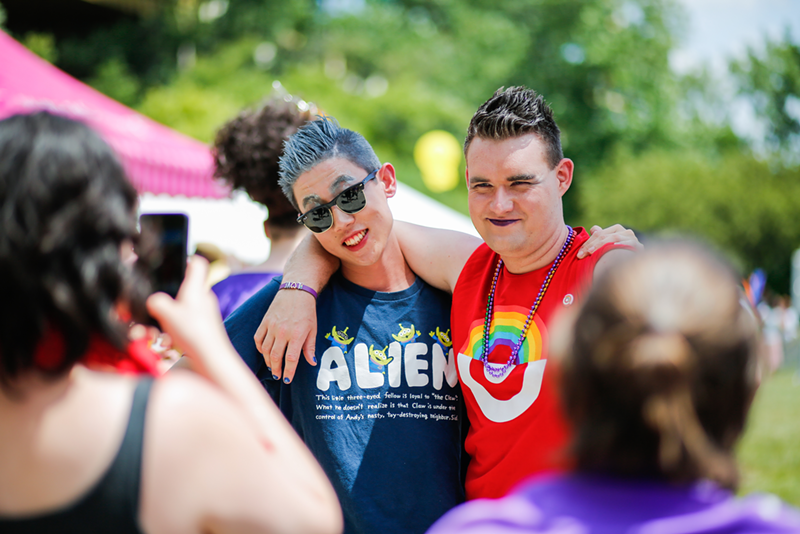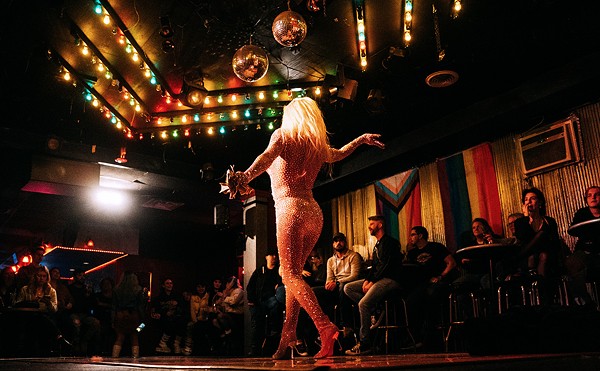The LGBTQ community has seen a lot go down this year. Here’s some of highlights (and lowlights) that made up this year’s rainbow.
Countries that Legalized Same-Sex Marriage
As of this year, 26 countries have fully given same-sex couples the right to marry. Slews of territories and states across the world have also recognized the LGBTQ movement. But it is still on the frontier of social change — according to a 2017 International LGBTQI association report, 72 countries still criminalize same-sex marriage. In eight, it’s punishable by death. So, work still needs to be done.
Finland: Despite being approved by the Finnish parliament in 2014, the law to legalize same-sex marriage just took effect in March last year.
Taiwan: On May 24, 2017, Taiwan became the first Asian country whose courts ruled same-sex marriage was legal, and ordered its parliament to follow suit. The law is expected to go into effect by May 24, 2019.
Germany: Last June, Germany legalized same-sex marriage across the nation with 393 votes in favor, 226 against and four abstentions. In October, the first marriages were issued.
The Faroe Islands: This archipelago in the Norwegian Sea — within the Kingdom of Denmark — legalized same-sex marriage after failed attempts in 2013/14 and 2016. Civil same-sex marriage and adoption went into effect in July 2017.
Malta: Malta passed legislation on July 12, 2017 and issued a legal notice to commence the law by the first of September. Prior, in 2014, it allowed civil unions the same rights as marriage, including joint adoption.
Australia: This country’s parliament passed legislation on Dec. 7, 2017 and two days later, the law went into effect. On Dec. 15, the first same-sex marriage under Australian law was held.
Bermuda: In May 2017, the British territory’s supreme court legalized same-sex marriage. In February 2018, Bermuda then banned same-sex marriage via the “Domestic Partnership Act.” On June 5, the Supreme Court ruled once again that a ban is unconstitutional.
Other British territories also legalized same-sex marriage in the past year, including The Falkland Islands, Saint Helena, Ascension and Tristan Da Cunha and Guernsey. Mexican states Chipeas, Puebla and Baja California made the change, too.
The Fight for Equal Rights in Tribal Law
In 2015, Americans were granted marriage equality in all 50 states. But American Indian tribal law didn’t necessarily follow suit — tribes have jurisdiction over their members because they are sovereign nations. High Country News reported that of 567 federally recognized indigenous tribes, only 35 legally recognize same-sex marriage (as of 2017).
Diné Equality is one group on the frontlines fighting to protect LGBTQ tribe members, specifically within the Navajo Nation (Diné is the preferred term used by Navajo people). The Navajo passed the Diné Marriage Act in 2005, which prohibited same-sex marriages. It was never repealed.
But that struggle is seeing headway. In March of last year, the Osage Nation in Oklahoma passed a proposal that allowed same-sex marriages to be performed on tribal grounds, with 770 voting for and 700 voting against.
Also in March 2017, the Prairie Island Indian Community (located in Minnesota) legalized same-sex marriage via a change to their domestic relations code. Now, it states that “two persons of the same or opposite gender may marry.”
Then in October, the Ak-Chin Indian Community agreed to uphold the results of a civil suit that changed how same-sex marriages were recognized. In 2015, one of the tribe’s members filed a lawsuit alleging that the Ak-Chin stance on same-sex marriage — the law explicitly banned same-sex marriages and did not recognize them if they were performed off the reservation — violated equal protections stated under the Indian Civil Rights Act. The lawsuit was found in favor of the member and the tribe’s chairman said the ruling would not be repealed. It was a victory — and one that may influence other tribes in the future.
A Year in Transgender Rights
Protections for transgender and gender non-conforming people has just begun to enter mainstream conversation — and with more awareness the community has seen victories, but also setbacks.
In 2017, 28 transgender people in the U.S. were violently shot or killed, according to the Human Rights Campaign. Halfway through 2018, the community has lost 12 others. More faced discrimination, prejudice and injustice based on their identity.
Locally, there are some resources transgender folks and their families can access.
Cincinnati Children’s Hospital has a trans clinic. If you’re ready to take those steps (or still navigating), they provide resources and services specifically tailored toward trans health for ages 5-24. It’s one of the only in the region — many patients come in from surrounding states seeking treatment.
There’s also Heartland Trans Clinic, which provides essential support to the trans and queer community by providing accessible resources and services. Plus, there’s a community built around this place where people can find belonging, hope and love.
Representation in Politics
After Donald Trump was elected to the oval office, many were worried that they’d see rollbacks to protections set in place. And, in general, that progress made would be lost. In reaction, 2017 elections saw an outpouring of women, minorities, young people and LGBTQ individuals throwing their hat in the ring to campaign for social change.
In November 2017, eight transgender people were elected to public office, more than ever before. Here are their victories:
Andrea Jenkins (Minnesota): Jenkins was the first openly transgender black woman to be elected to office here. She took a seat on the Minneapolis City Council.
Phillipe Cunningham (Minnesota): Cunningham followed suit, becoming the first openly transgender man of color to be elected to the Minneapolis City Council.
Danica Roem (Virginia): You likely saw news coverage of Roem’s historic win. She became the first openly transgender person to win a state legislature seat, beating out 11-term Republican Bob Marshall.
Lisa Middleton (California): Middleton became the first trans person elected to a non-judicial office in California, according to Equality California. With her was bisexual council member Christy Holstege — making the Palm Springs City Council 100 percent LGBTQ.
Stephe Koontz (Georgia): Koontz won a seat on the Doraville City Council by six votes in Georgia, becoming the only openly transgender person to represent the state.
Tyler Titus (Pennsylvania): Titus was elected to the Erie City School District School board, serving as the first openly transgender person to do so in the state.
Gerri Cannon (New Hampshire): In a tight race, Cannon won a spot on the Somersworth School Board. In 2018, she plans to run for New Hampshire State Representative, according to her LinkedIn page.
Raven Matherne (Connecticut): Matherne was elected to Stamford Board of Representatives. At 30, she is Connecticut’s first transgender lawmaker.*
Jacquelyn Ryan (Massachusetts): Rounding out the list, Ryan was elected to a seat on the Southbridge School board in Massachusetts.
Bonus: Our upstairs neighbor, Canada, elected their first transgender mayor; Julie Lemieux now serves Très-Saint-Rédempteur in Quebec.
Other Landmark Cases
June 27, 2017: As of last year, residents in Washington, D.C. could choose a gender-neutral option for their driver’s license, and they were the first in the country to do so. Internationally, policies exist in Canada, India, Bangladesh, Australia, New Zealand and Nepal.
July 9, 2017: The Church of England decided to offer services to transgender people of the Anglican faith, extending a welcoming hand to the community.
July 26, 2017: Trump tweets. A lot. That fact is undeniable. But, one tweet in particular sparked a hotbed of social media fury and debate (if you can call Twitter discourse “debate”): “After consultation with my Generals and military experts, please be advised that the United States Government will not accept or allow Transgender individuals to serve in any capacity in the US Military.”
But can a Pres make a declaration so swiftly via social media? Nah. That December, a second federal judge struck down Trump’s statement. The Pentagon later announced that they would begin to process transgender applicants to the military. By Feb. 26, 2018, the first transgender person had signed a contract to join.
The story unraveled more in March 2018, when a new policy would disqualify most transgender people from serving: It stated that those with a history of gender dysphoria — those who would need medical treatment, medication and surgery — could not join (with exceptions). On June 15, the federal court ruled that the Trump administration cannot implement its ban. Currently, a lawsuit against the ban is in courts.
Sept. 18, 2017: Lena Waithe became the first black woman (and black lesbian) to win an Emmy for comedy writing, awarded for the Master of None “Thanksgiving” episode, aka a story of a young, queer black woman coming out to her family. She ended her speech with thanks for “embracing a little queer black girl from the Southside of Chicago.”
Oct. 4, 2017: Attorney General Jeff Sessions said that the 1964 federal civil rights law does not protect transgender workers from workplace discrimination. In a memo to federal prosecutors he added that the department would use this in future cases. Thankfully, in February of this year, the Second Circuit Court of appeals released an opinion that directly disagreed with Sessions’ — that is, discriminating based on sexual orientation should constitute a form of, well, discrimination.
Oct. 16, 2017: California Gov. Jerry Brown signed a bill to make the Sunshine State the first in the nation to recognize a third gender. Californians can now legally identify as “nonbinary.” All state-issued documents will reflect this move. The bill also makes the transition process easier (be it changing documentation from male to female, female to male or male/female to nonbinary). Citizens don’t need to obtain a doctor statement or appear in court to make it official.
Nov. 7, 2017: The New York City Metro Transportation Authority announced that the days of “ladies and gentlemen” had come to an end. As a replacement, they opted to replace the term with gender-inclusive language, i.e., passengers/riders/everyone.
March 4, 2018: Call Me By Your Name snagged the Best Picture Oscar nomination*, marking the second year in a row where an LGBTQ-centered film has been nominated (Moonlight won in 2017). Also, Daniela Vega (A Fantastic Woman) made history as the first openly transgender Oscar presenter — for Sufjan Stevens’s performance of “Mystery of Love” from Call Me By Your Name.
Director Yance Ford also became the first transgender filmmaker to have a film nominated, for Strong Island.
June 4, 2018: In a Supreme Court case gone viral, a Colorado baker refused to bake a cake for a same-sex couple’s wedding based on religious beliefs. The court ruled in favor of the baker, Jack Phillips of Colorado, with a 7-2 vote.
Originally, the Colorado Civil Rights Commission ruled against the baker, which Justice Anthony M. Kennedy’s majority opinion said was “hostile” toward religion based on a remark made by one of its members.
June 8, 2018: New Hampshire may be a Republican-led state, but Gov. Chris Sununu signed a bill that bans discrimination based on gender identity and the use of conversion therapy on minors.
He told reporters at WMUR that they needed to ensure that New Hampshire “is a place where every person, regardless of their background, has an equal opportunity to pursue their dreams and to make a better life for themselves and their families.”
*An earlier version of this story incorrectly stated Raven Matherne is the youngest lawmaker elected to Stamford Board of Representatives and listed Call Me By Your Name as a winner and not a nominee for the Best Picture Oscar







